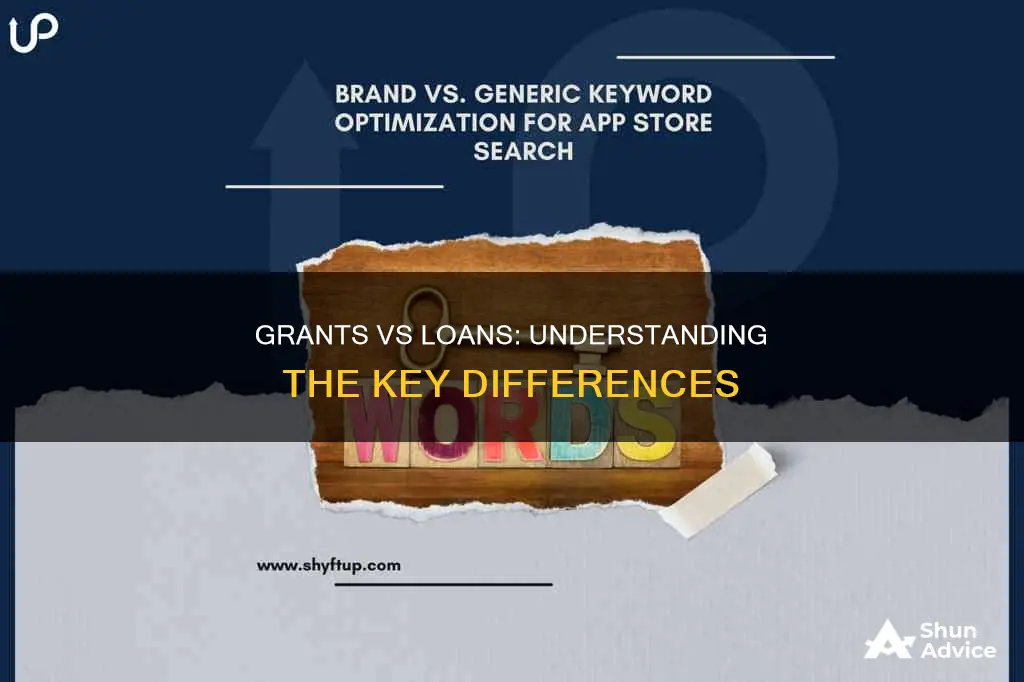
Grants and loans are two popular funding options for businesses. While both are similar in that they are long-term means of finance, they have several key differences. The most significant difference is that loans must be repaid, whereas grants do not need to be paid back. Grants are often awarded by government departments, trusts, or corporations, while loans are usually given by banks, private lenders, or individuals. Loans are generally easier to obtain than grants, as lenders are motivated by the return of the loan amount plus interest. However, grants may be more suitable for businesses that do not want to take on the financial risk associated with loans.
What You'll Learn

Grants are a gift, loans must be repaid
Grants and loans are two popular funding options for businesses. However, they have distinct characteristics, and it is essential to understand the difference between them to determine the best resource for your business.
Grants are essentially a gift or financial aid. They are a sum of money awarded to individuals, businesses, or institutions for a specific purpose. Grants are provided by government departments, trusts, or corporations and are given to individuals, businesses, educational institutions, or non-profits. They are funded exclusively for authorized purposes. For instance, grants are often sanctioned for victims of natural calamities or those who want to start their own business. Grants are non-repayable and non-interest-bearing, meaning you don't have to pay back the money you receive. However, recipients must meet certain criteria and comply with specific requirements, such as reporting on how the funds are spent. The grant application process can be lengthy and complex, with high competition for a limited number of grants.
Loans, on the other hand, are a sum of money borrowed from a lender, typically a bank or financial institution, that must be repaid with interest over time. Loans are generally easier to obtain than grants because lenders are motivated by the return on their investment. Loan applications focus on the financial health of the business and often require various financial records and business plans. Loans offer more opportunities and greater flexibility in how the funds are used, but they put your assets at risk if you are unable to repay them.
In summary, the key difference between grants and loans is that grants are a gift of financial aid that does not need to be repaid, while loans are borrowed funds that must be repaid with interest. Grants are typically awarded by government bodies and are highly competitive, while loans are more readily available from banks and financial institutions and often come with eligibility requirements.
Unitranche Loans: Understanding This Unique Debt Financing Option
You may want to see also

Grants are harder to obtain
Grants are typically awarded by government departments, trusts, or corporations, and they are given to individuals, businesses, educational institutions, or non-profits. They are given for a specific purpose and are often awarded based on predetermined criteria, typically related to the applicant's merit or the potential impact of their initiative.
Loans, on the other hand, can be obtained from banks, private lenders, or individuals. This creates more opportunities to obtain financing. Banks are motivated to lend by the expectation of receiving the loaned amount back with interest. Loans are also more flexible in terms of their use; they can be spent on any business expense, whereas grants are usually limited to specific purposes.
The application process for loans focuses more on the financial health of the business. Lenders will require financial and business records, including credit reports, cash flow statements, tax returns, and a detailed business plan. However, loans can often be obtained quickly and easily, especially from online lenders.
In summary, grants are harder to obtain due to their limited availability, competitive nature, lengthy application process, and strict eligibility criteria.
Becoming a Loan Signing Agent: Florida's Requirements
You may want to see also

Loans are more flexible
When it comes to funding for businesses, loans offer more flexibility than grants. Loans are generally easier to obtain and can be given by banks, private lenders, or individuals, whereas grants tend to be few and far between and are highly competitive. Loans can be used for a range of purposes, from expanding your business to funding a marketing campaign or covering operational costs, whereas grants are typically awarded for a specific purpose.
Loans offer more opportunities to successfully secure funding. They are virtually limitless in number, provided that you qualify for them, and the amount of financing you can obtain is limited only by your credit and ability to repay. With grants, there is a limited number available, and the amount of funding is typically fixed and less than the average loan amount.
The application process for grants can often be long and complex, requiring large amounts of paperwork and a lengthy selection process. Grants may also come with eligibility requirements that must be met and reporting responsibilities that detail how the funds are spent. Loan applications, on the other hand, focus more on the business's financial health and ability to repay the loan.
If your business needs funds immediately, a loan is often a quicker and more efficient way to obtain financing. Many lenders provide financing quickly and easily online, and there are a variety of loan types available to suit your needs.
Overall, loans offer greater flexibility in terms of availability, eligibility, purpose, and speed of funding compared to grants.

Grants are less risky
Grants are a no-risk way to obtain financing. They are non-repayable and do not need to be paid back, meaning there is no risk of debt or losing assets. Grants are essentially gifts, and once awarded, the money is yours without any strings attached. There is no need to worry about monthly payments or interest.
Loans, on the other hand, must be repaid, and failure to do so can put your credit rating and assets at risk. Loans are a form of debt, and the lender expects to see a return on their investment. This means that if you are unable to repay, you may have to provide collateral and put your assets at risk. Loans come with the requirement to repay the money, with interest, within a certain time period. This is a key difference between grants and loans and is an important financial risk to consider.
Grants are typically awarded by government departments, trusts, or corporations, whereas loans are usually given by banks or financial institutions. Banks and credit unions that issue loans will have highly specific terms that the borrower must comply with. Loans often require collateral, which can put personal or business assets at risk. This is another key area of risk that grants do not carry.
The grant application process can be lengthy, and grants are often difficult to obtain, with high competition. However, this does not carry financial risk in the same way that loans do. Loans are more readily available and can be obtained quickly, but they do carry the risk of debt and losing assets if the borrower cannot keep up with repayments.
Overall, grants are a safer option for those who are eligible, as there is no risk of debt or losing assets. Loans offer more opportunities and greater flexibility in how the money is spent, but they come with the significant financial risk of repayment, which can have serious consequences.

Loans are quicker to secure
Loans are generally quicker to secure than grants. This is because loans are often easier to obtain, with more opportunities to obtain the necessary financing. Banks and credit unions that issue loans are typically motivated by receiving the loan back plus interest. As such, loans are available to many people and businesses as long as they meet the lender's requirements.
Loans can be obtained from a variety of sources, including banks, private lenders, or individuals, such as family and friends. This creates more opportunities to obtain the necessary financing. Many lenders provide financing quickly and easily online, allowing borrowers to view their payment estimate in a matter of seconds and apply online in minutes.
In contrast, grants are limited in the amount of financing they can provide, with only a certain amount of funding available each year. Grants are also highly competitive and difficult to obtain, with a lengthy selection process and significant amounts of paperwork. The application process can be complex and time-consuming, sometimes requiring applicants to hire a grant writer or expert to help navigate the process.
Additionally, grants tend to have more specific eligibility requirements that must be met. For example, many grants are only available to non-profit organizations, educational institutions, or individuals starting a business to become self-dependent. As a result, the process of receiving a grant can be slower compared to the steps needed to secure a loan, which may be a drawback if immediate funding is required.
Overall, while both grants and loans can provide necessary funding for individuals and businesses, loans are typically quicker to secure due to their wider availability, simpler application process, and faster approval and funding release.
Frequently asked questions
The main difference is that loans require repayment with interest, whereas grants do not. Grants are essentially gifts that do not need to be paid back.
Grants are limited in the amount of financing they can provide, as they are often sponsored by government departments with a set amount of funding available annually. Loans, on the other hand, offer more opportunities as they can be obtained from banks, private lenders, or individuals, allowing for greater financing options.
Grants are typically awarded by government departments, trusts, or corporations to individuals, businesses, educational institutions, or non-profits. Loans are commonly provided by banks, but they can also be obtained from private lenders or individuals, such as family and friends.
Loan applications tend to focus on the financial health of the business, requiring documentation such as financial records, credit reports, and business plans. Grant applications may have specific requirements, such as reporting responsibilities detailing how the funds are spent, and can often be lengthier processes than loan approvals.
Grants may come with conditions on how the funds can be spent, and it is rare for them to cover capital assets or operational costs. Loans, however, offer more flexibility, allowing businesses to spend the money on any expenses they see fit.







